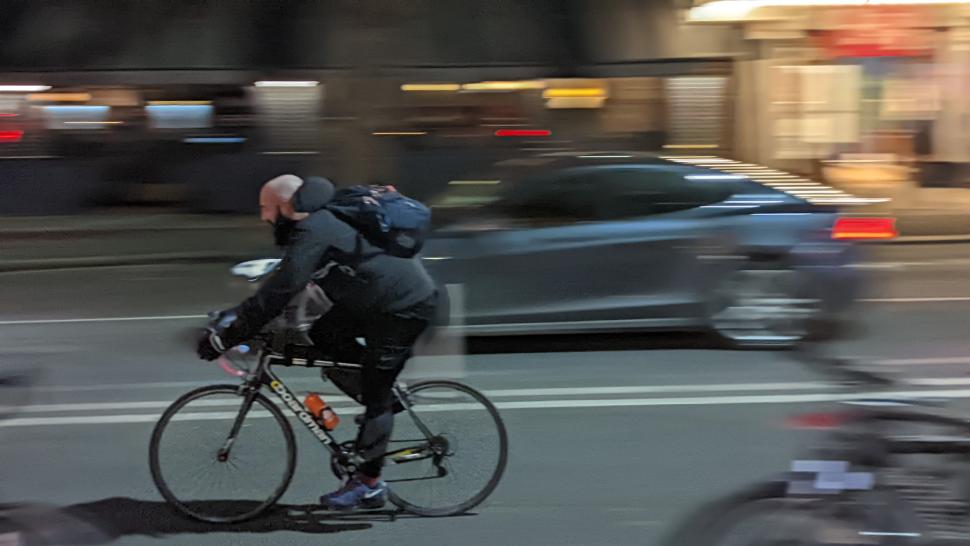- News
- Reviews
- Bikes
- Accessories
- Accessories - misc
- Computer mounts
- Bags
- Bar ends
- Bike bags & cases
- Bottle cages
- Bottles
- Cameras
- Car racks
- Child seats
- Computers
- Glasses
- GPS units
- Helmets
- Lights - front
- Lights - rear
- Lights - sets
- Locks
- Mirrors
- Mudguards
- Racks
- Pumps & CO2 inflators
- Puncture kits
- Reflectives
- Smart watches
- Stands and racks
- Trailers
- Clothing
- Components
- Bar tape & grips
- Bottom brackets
- Brake & gear cables
- Brake & STI levers
- Brake pads & spares
- Brakes
- Cassettes & freewheels
- Chains
- Chainsets & chainrings
- Derailleurs - front
- Derailleurs - rear
- Forks
- Gear levers & shifters
- Groupsets
- Handlebars & extensions
- Headsets
- Hubs
- Inner tubes
- Pedals
- Quick releases & skewers
- Saddles
- Seatposts
- Stems
- Wheels
- Tyres
- Health, fitness and nutrition
- Tools and workshop
- Miscellaneous
- Tubeless valves
- Buyers Guides
- Features
- Forum
- Recommends
- Podcast
news
 Cyclist in the evening 02 © Simon MacMichael.jpg
Cyclist in the evening 02 © Simon MacMichael.jpgCyclists wearing helmets seen as "less human" than those without, researchers find
A new study from Australia found that an alarming number of people do not see cyclists as human, with those riding bicycles while wearing helmets or safety vests seen as less human compared to those without.
The research comes from Mark Limb of Queensland University of Technology and Sarah Collyer of Flinders University, and was published in Volume 95 of Transportation Research Part F: Traffic Psychology and Behaviour.
Noting that efforts to increase cycling uptake are hindered by negative attitudes towards cyclists, the survey asked 563 people their views on cyclists and attempted to provide empirical evidence that explains these dehumanising perceptions.
Of 563 people surveyed, 30 per cent considered cyclists less than fully human, and the researchers looked to evaluate how wearing helmets and other safety clothing may affect the way cyclists are viewed.
"We tested this hypothesis through a survey comprised of two-paired alternate forced choice questions to identify which image of a cyclist respondents consider to be less human," the study's abstract explains.
"We then analysed the results using a Bradley-Terry probability model. We found images of cyclists wearing helmets or safety vests to have a higher probability of being selected as less human compared to images of cyclists wearing no safety equipment. The results have implications for research on cyclist dehumanisation and its mitigation."
Cyclists with helmets were perceived as less human compared to those without, while cyclists with safety vests and no helmets were perceived as least human.
The researchers concluded that dehumanisation related more to visible safety gear than obstruction of hair or eyes and the perceptions of dehumanisation also varied based on respondent gender.
On the same lines, cyclists wearing a cap were viewed as more human than those wearing a full helmet.
"Our findings add to this growing research, suggesting that cyclists wearing safety attire, particularly high-visibility vests, may be dehumanised more so than cyclists without safety attire," the study concludes.
"As dehumanisation has been found to be predictive of hostile and aggressive behaviour (Kteily & Landry, 2022), our finding highlights a potential conflict around the perception and utility of safety gear such as high-visibility vests; although designed for safety, they may inadvertently increase levels of hostility and aggression towards this group of vulnerable road users."
Dan is the road.cc news editor and joined in 2020 having previously written about nearly every other sport under the sun for the Express, and the weird and wonderful world of non-league football for The Non-League Paper. Dan has been at road.cc for four years and mainly writes news and tech articles as well as the occasional feature. He has hopefully kept you entertained on the live blog too.
Never fast enough to take things on the bike too seriously, when he's not working you'll find him exploring the south of England by two wheels at a leisurely weekend pace, or enjoying his favourite Scottish roads when visiting family. Sometimes he'll even load up the bags and ride up the whole way, he's a bit strange like that.
Latest Comments
- chrisonabike 2 sec ago
Well if you *can* interview the original riders at all surely they worked, at least?...
- David9694 19 min 54 sec ago
Live: Car plunges over wall and lands on beach rocks...
- biking59boomer 26 min 2 sec ago
Looks like yet another bike share service that's going to fold because of selfish idiots.
- biking59boomer 29 min 44 sec ago
It would be more educational to give them a fine. They wouldn't forget that in a hurry.
- headingley 42 min 18 sec ago
Here in Leeds the fantastic network of city centre protected cycle lanes are annually partly blocked by the Christmas Market. I can only guess what...
- quiff 4 hours 30 min ago
Fair point - I was restricting myself to pedal bikes. As I've never spent that kind of money on anything though (mortgage doesn't count), it's kind...
- brooksby 5 hours 32 min ago
And finally: I wonder how many of the "more than 3,000" signatures on that petition are actually locals, who live or work there (and are not just...
- Doug_D 7 hours 8 min ago
Another book suggestion - I can highly recommend "Lost Summers and Half-Forgotten Afternoons: A Mint Sauce collection" - a beautifully presented...
Add new comment
33 comments
Unfortunately the nut was already gone.
Well you know a good way to protect your nut...
Wear a helmet
(Couldn't resist)
I thought it was talking about cycling infra in Ipswitch...?
Pages